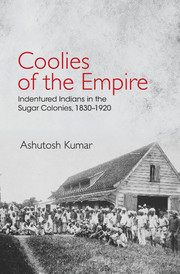Book contents
- Frontmatter
- Dedication
- Contents
- List of Figures and Maps
- List of Tables
- Preface
- Abbreviations
- Maps
- 1 Introduction: Indentured Emigrants in the Literature
- 2 Naukari, Network and Indenture
- 3 Regulating Indenture
- 4 The Journey
- 5 Agriculture and Culture between Two Worlds
- 6 Writing the Girmitiya Experience
- 7 The End of the Indenture System
- 8 Conclusion
- Appendices
- Glossary
- Bibliography
- Index
2 - Naukari, Network and Indenture
Published online by Cambridge University Press: 28 February 2018
- Frontmatter
- Dedication
- Contents
- List of Figures and Maps
- List of Tables
- Preface
- Abbreviations
- Maps
- 1 Introduction: Indentured Emigrants in the Literature
- 2 Naukari, Network and Indenture
- 3 Regulating Indenture
- 4 The Journey
- 5 Agriculture and Culture between Two Worlds
- 6 Writing the Girmitiya Experience
- 7 The End of the Indenture System
- 8 Conclusion
- Appendices
- Glossary
- Bibliography
- Index
Summary
Introduction
This chapter looks at the history of long-distance migration among north Indian peasants and attempts to provide a link between this migratory behaviour and indentured migration. A particular focus is on conceptions of the indenture system among north Indian peasants. It also probes peasant awareness of the indenture system through an analysis of official colonial ethnographic reports. In two particularly rich official enquiries done in 1882 by Major Pitcher in United Provinces and George Grierson in Bihar, two major labour catchment areas from which migrants were recruited have been examined.
Culture of Migration for Naukari
To understand the culture of migration and its entailments during the colonial period, it is necessary to look into the prehistory of long-distance migration in northern India. The culture of peasant migration in this region can be traced back to the beginning of sultanate rule in north India. It is evident in the poetry and folklore of the region dating back to even fifteenth century. The poetry and folklore popular in the region depict the feelings of separation of a wife from her husband, who left home to serve distant masters. A widespread motif in poetry and folklore is that of separation, especially the separation between a travelling husband and his wife. As Amin has suggested, a poem written by Abdul Rahim Khan Khana in the ‘barwai chand’ metre focuses on one such virah (separation) in the sixteenth century. The original barwai chand was composed by the wife of a servant of Abdur Rahim Khan Khana to express the love and longing the newly married wives experienced when separated from their respective husbands who went to serve distant masters. The first ever barwai went as follows: prem pirit ka birwa chalev lagai; seenchan ki sudhi leejau, murjhi na jay (Away you go planting the tender sapling of love and desire; beware it needs watering else it might dry up).
- Type
- Chapter
- Information
- Coolies of the EmpireIndentured Indians in the Sugar Colonies, 1830–1920, pp. 20 - 54Publisher: Cambridge University PressPrint publication year: 2017



